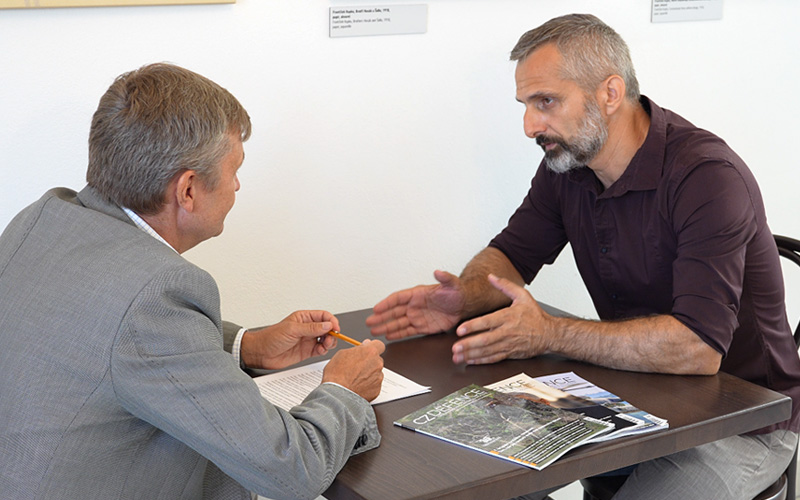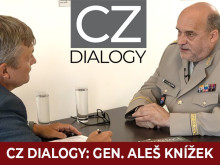Colonel Otakar Foltýn: Anything that is radical is contrary to the interests of the Czech Republic
One of the most frequent topics in recent times is the setting of strategic communication (StratCom) of the state. This is the third attempt by current government. At the beginning of July, Colonel Otakar Foltýn took over the position of coordinator of strategic communication at the Office of the Government of the Czech Republic for six months, and even before his appointment he had already started to arouse passions among the public with his explanations on the topic of strategic communication. For some, he is heading in the right direction, for others he is simply a censor. Strategic state communication is nothing new and is successfully used by many European countries. The Czech Republic is at the beginning in this respect, and it is therefore clear that setting up StratCom will be a long-term process. We have invited Colonel Otakar Foltýn to the next episode of our CZ DIALOGUES program to discuss the definition, meaning and pitfalls of strategic communication.
Video: Interview with the Government Coordinator of Strategic Communications Colonel Otakar Foltýn. / CZ DEFENCE
Otakar Foltýn himself is aware that not much can be accomplished in six months in anything strategic. "Nevertheless, we have to try. It is true that two and a half years ago a robust British-style state StratCom was proposed, really very much motivated by what they have in the UK. It didn't go through and now we're starting horribly late, it's true. On the other hand, it's never too late," the government's strategic communications coordinator says at the start of the interview, adding that he expects the first results of his team's work to be available on 21 August. "Naturally, it will not be just about the anniversary, but the primary basis must be value communication. What we haven't done here for thirty years and have neglected," Foltýn adds.
If we want to get a definition of strategic communication, according to Otakar Foltýn, it is the synchronisation of activities, actions and communication of the main state institutions. And what does this mean in practice? "The very simplest explanation is that you have to bring words and actions into line. It is very undesirable for the state, and especially the executive branch, to do something other than what it presents publicly. Which, by far, is not only what happens in our country from time to time, and it is really undesirable. The state must communicate clearly, authentically, understandably, truthfully, but at the same time in a form that will be successful in the environment of modern information media, especially social networks. And to simplify things completely. For thirty years, we have not explained to citizens what is so important about the Czech Republic that it is worth defending, that it is worth citizens standing up for their state, that they should love their state. We thought that it would somehow come with freedom itself," says the government's strategic communications coordinator, adding that it doesn't work that way.
According to Foltýn, a state that does not explain to its citizens why it makes sense to defend it and why it makes sense to be a proud citizen of their state cannot expect people to do so on their own. "If you look at Article 17 of the Charter of Fundamental Rights and Freedoms, that article not only prohibits censorship, but it also mandates in paragraph 5 that the state must communicate with its citizens. And that is exactly what we are going to do," Otakar Foltýn plans to do.
And of course it's not just about the content, but also about the form. According to the government coordinator, the ideal way is long-term, preferably conciliatory and calm communication, as is the case in the UK or Finland, for example. "In both of these examples they have been working on this for decades and have thousands of people - in the case of the UK, in the case of Finland hundreds – directly under the government. That's a pipe dream here. Moreover, as I say, we are behind schedule. That said, the communication here needs to be a bit stronger and more pronounced and, I am not afraid to say, at times provocatively higher. What I say is not very different from what Finnish politicians or Finnish officials, for example, say. But very often I use stronger rhetoric. Firstly, because it is my own and secondly because it is a way of drawing attention to it. Believe me, I don't enjoy arguing with pro-Russian websites and having lies thrown at me. But unfortunately, it's part of the job," explains Otakar Foltýn, the government's strategic communications coordinator.
Of course, the basis of everything is capable people, so even in the case of effective strategic communication there must be a quality team. According to Foltýn, this is a good mix of thirteen people from different disciplines. "First of all, the offer was made to all former members of the StratCom department who had worked in the government before, and they were supplemented by experts from the civil service as well as from the civilian sector. So for example, the name of Dodo Dobríka resonated, who I think is an outstanding creative professional. Your viewers may know him from the Gift for Putin initiative. Then the head of analytics, for example, is a former police officer who I think is a great manager. I think I have good people," Foltýn praises himself.

Critics of strategic communication point to the creeping rise of censorship in the Czech Republic. According to Colonel Foltýn, the use of the word censorship in the Czech environment is absurd. "Simply by the already mentioned Article 17 of the Charter of Fundamental Rights and Freedoms, censorship is forbidden in times of state peace. The state may not censor. You can say, write, publish whatever you want and the state cannot do anything to you. So it's really humorous that although the state can no longer censor in any way because of constitutional rules, we are attacked for censoring, and those who attack us are not at all surprised that they often attack us in a very vulgar way, they lie very vulgarly, because there is no censorship here and yet nothing happens to them," Foltýn said. This, he says, is clear proof that we have the absolute freedom of speech that is possible. According to him, nobody is going to do censorship in this country either. "And by the way, even if he wanted to, he couldn't a hundred times. There are no means to do so. There is no way to do censorship here, there is no mechanism for it. And the very fact that anyone is even accusing anyone here of censorship is absurd. And by the way, a large part of these messages come from pro-Russian websites," Foltýn added.
The basis of strategic cooperation is its apolitical nature. However, it is questionable whether this approach is even realistic at present. It was precisely for the sake of apoliticality that Otakar Foltýn insisted that this new department operate within the structure of the Office of the Government so that political changes of government would not affect the work of his team. "Using the example of Finland, there was a change of government from the right to the left. There will undoubtedly be some changes in social policy, but certainly no change at all and no change in the approach to Russia, for example. That is to say, there is a consensus across the political spectrum on basic values, and this should be the case here too. This means that it is also in the interests of the opposition that the state administration should function, because we are in a democracy, and in a democracy it is an iron law that the opposition will come to power one day. Therefore, the opposition that comes to power should have an interest in taking over a functioning state administration, including functioning strategic communication," Foltýn explained. The domestic issue, however, is whether this is a realistic ambition.
"Ideally, you should not be able to tell from any statement I make what my personal political preferences are. And I submit that you won't. If you look at any of my public appearances, you can't say that I've ever in one word expressed any of my sympathies towards any political entity. What you can tell is a dislike of radicalism, any kind of radicalism, be it left-wing or right-wing. Anything that is radical is contrary to the interests of the Czech Republic. And of course I will challenge that, but I certainly will not speak in favour of any political entity. That is not my job and it should not be my job," Otakar Foltýn explains his position.
Otakar Foltýn's mandate should last six months, until the end of this year. We wanted to know what tasks can be started in this relatively short period, whether any can be completed and what will be the result of a job well done for Otakar Foltýn. "Of the things that I imagine could be accomplished within six months, the first is to get the basic value themes into the public consciousness. This means, I said at the beginning, what we Czechs should be proud of and why we should be able to stand up for or defend our country. These are basic values such as freedom, dignity, justice and tolerance. And these are all things that we have in the preamble of the Constitution, either directly or indirectly. Compared to any previous historical period, we have the highest freedom of speech. We have the rule of law - albeit sometimes with things I may not like, but it still functions as the rule of law. We definitely have a high level of freedom and we definitely have democracy, which is perfectly demonstrated by the fact that we have alternating parties in government and opposition, constantly exchanging power depending on how the elections turn out," Foltýn defines. According to him, these are things that we must explain, but they are not self-evident and certainly not constant. As an example, there are some countries where authoritarian, or very often radical, political entities have won. There are also countries in the European Union where, according to Mr Foltýn, they have moved from, say, a democracy with a high degree of freedom to a controlled democracy, as they call it, or to an authoritarian form of government, which, according to Otakar Foltýn, we should not want.
If we look at the current system of strategic communication between the Ministry of Defence and the Czech Army, it must be said that the Ministry of Defence is much more visible than other ministries. "Defence, especially in the case of the Army of the Czech Republic, can be seen to have a very clear communication strategy and to stick to it. If you look at what the army is communicating in the long term, it is obvious that the four or five basic lines that the army has set for itself are being followed in the long term, it is following them and at the same time it is using modern approaches, for example, we have the first Czech army influencer and so on," Foltýn said. According to him, this is a trend used by Western countries. And it is also a way to get closer to young people who, for many reasons, do not follow the state's communication and, if they do, they do so more on social media than on mainstream media. From this perspective, our army, both in terms of graphics, sticking to its strategy that it said at the beginning and using modern approaches, is in any case one of the better ones.

It is precisely in the context of communication that the question arises whether a soldier or a soldier in active reserve has the right to communicate his or her personal opinions on social networks, which may not be entirely in line with the rhetoric of the Ministry of Defence or the army. "Here I'm going to use the fact that I'm a lawyer in civilian life to give you a legal answer. Yes, it does. The law is pretty clear in this case. It means soldiers have limited freedom of speech as long as they are in uniform and on active duty. That is, if I were sitting here right now in uniform and obviously on duty or on active duty, to be precise, I obviously can't present my views. Or rather, I would have to say, at this point in time, I am presenting my own views, not the views of the armed forces, which is what the Secretary of Defense's order requires," Foltýn defines communication. From this perspective, soldiers have limited freedom of speech. They simply cannot say whatever they want while on duty. "During my personal leave, meaning I'm not in uniform, I'm on leave, so if I say I'm speaking for myself, I have freedom of speech. On the other hand, there are, shall we say, ethical constraints. That is, as I have already said, a soldier is not forbidden by law to express sympathy for a political entity while off duty. Personally, I think that this is unbecoming of soldiers, so I don't do it and I would like other soldiers to have this ethical restriction," the government's strategic communications coordinator said about the soldier's freedom of speech, adding that the army is supposed to be non-partisan and cannot be completely apolitical because it is part of a political environment. In any case, it is supposed to be non-partisan. "For a commodity or value as valuable as freedom of expression, it cannot be completely restricted to anyone in the state, including the military. And the fact that very often, even in good faith, some soldier will slap something at 11 o'clock at night after having three beers or a fight with his wife - yes, that's the price of having that freedom and the outcome may not always be ideal. But the fact that it remains in the public space and that very often, let's say, with those media talented soldiers, it can resonate - that's true. But I dare say that for those soldiers who are visible in the media, such as the Chrudim paratrooper or the Tankist, I do not observe any misconduct there and certainly none of them are breaking the law. On the contrary, I believe that they represent the army very well and that they work for the state even in their personal time. So, for me, at this point in time, it can be said that this is rather positive and in the case of the examples given, it is even highly desirable," said Colonel Otakar Foltýn, Coordinator of Strategic Communications at the Office of the Government of the Czech Republic in an interview.
To learn more, listen to the full interview at the beginning of this article.



















